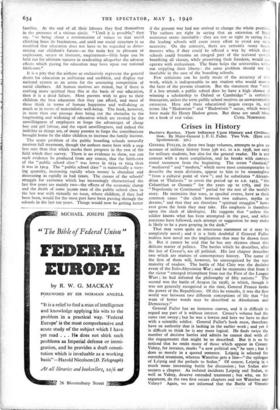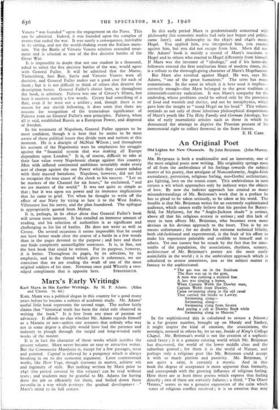Crises in History
GENERAL FULLER, in these two large volumes, attempts to give an account of military history from 336 B.C. to A.D. 1938, not only for military students, but also for the general reader. He is not content with a mere compilation, and he breaks with conven- tional treatment from the beginning. The terms "classical," " mediaeval " and "modern," which serve most contemporaries to describe the main divisions, appear to him to be meaningless "from a cultural point of view "; and he substitutes "Alexan- drian or Thalassic" to cover the period up to A.D. 1453, "the Columbian or Oceanic" for the years up to 1763, and the "Napoleonic or Continental" period for the rest of the world's story. He maintains that wars, as epochal events, have as their common cause "the clash between two cultures, myths or dreams," and that they are therefore "spiritual struggles" how- ever gross the form they may take. His emphasis is therefore upon the clash of ideologies. He suggests that "unless the soldier knows what has been attempted in the past, and what reactions have followed, each attempt or suggestion he may make is likely to be a pure groping in the dark"
That may seem quite an innocuous statement or it may be
comp:etely novel ; and it is a little doubtful if General Fuller realises how novel are the implications that may be drawn from it. But it cannot be said that he has any shyness about this delicate matter of politics. The battles which he describes, after the last of Creasy's, are all political. His last chapter describes two which are matters of contemporary history. The name of the first of them will, however, be unrecognised by the vast majority of readers. The battle of Mai Chio was the decisive event of the halo-Abyssinian War ; and he maintains that from it the victor "emerged triumphant from out the First of the League Wars ; he had defeated the philosophy of fifty nations." The second was the battle of Aragon (in 1938), in which, though it was not generally recognised at the time, General Franco broke the power of the Republicans. Of this he remarks, it was the first world war between two different conceptions of life that "for want of better words may be described as Absolutism and Democracy."
General Fuller has an immense canvas, and it is difficult to
regard any part of it without interest. Creasy's volume had the same vast sweep ; but he was a lawyer...and here we have to deal with a scientific soldier. General Fuller's book must, therefore, have an authority that is lacking in the earlier work ; and yet it is difficult to think he is any more logical. He finds twice the number of decisive battles and admits he cannot deal with all the engagements that might be so described. But it is to be noticed that he omits many of those which appear in Creasy. Valmy, for instance, marks "a new political era," he says ; but it does so merely in a quoted sentence. Leipzig is selected for extended treatment, whereas Waterloo gets a line—" the epilogue of Leipzig and the prelude to Sedan." Of course, Leipzig is a much more interesting battle for discussion ; but Sedan also secures a chapter. As isolated incidents Leipzig and Sedan, as well as Valmy, deserve extended treatment ; but why, on his argument, do the two first secure chapters and not Waterloo and Valmy? Again, we are informed that the Battle of Vittorio
Veneto "was founded" upon the engagement on the Piave. This can be admitted. Indeed, it was founded upon the complex of events that ended the war. It was surely a consequence, inevitable in its setting, and not the world-shaking event the Italians main- tain. Yet the Battle of Vittorio Veneto reheives extended treat- ment and is selected as one of the five decisive battles of the Great War.
It is impossible to doubt that not one student in a thousand, asked to select the five decisive battles of the war, would agree with General Fuller. It will be admitted that the Marne, Tannenberg, Sari Bair, Suvla and Vittorio Veneto were all decisive, and General Fuller makes out a good case for each of them ; but it is not difficult to think of others that deserve the description better. General Fuller's choice here, as throughout the book, is arbitrary. Pultova was one of Creasy's fifteen, but here it receives merely a few words. Creasy had something of a flair, even if he were not a soldier ; and, though there is no reason for any slavish following, it does seem that there are reasons for recognition of the tremendous significance of Pultova even on General Fuller's own principles. Pultova, when all is said, established Russia as a European Power, and disposed of Sweden.
In his treatment of Napoleon, General Fuller appears to be most confident, though it is here that he seems to be most aware of those political issues that divide men and nations at this moment. He is a disciple of McNair Wilson ; and throughout his account of the Napoleonic wars he emphasises his struggle against the "financial system that was making all Europe dependent upon London." It is, of course, difficult to take at their face value every Napoleonic charge against this country. Men with inflated continental ambitions invariably make every sort of charge against the one Power which they cannot subdue with their massed battalions. Napoleon, however, did not fail to recognise the true cause of the check to his success. "Let us be masters of the Channel for six hours," he exclaimed, "and we are masters of the world." It was not quite so simple as that ; but it was upon sea power and its immense implications that he came to grief. Yet when he thought to write off the effect of our Navy by trying to lure it to the West Indies, Villeneuve lost his nerve, and the plan foundered. The epilogue is appropriately quoted from Mahan.
It is, perhaps, in its obiter dicta that General Fuller's book will arouse most interest. It has entailed an immense amount of reading, and his selection of authorities is as significant and challenging as his list of battles. He does not write as well as Creasy. On several occasions it seems impossible that he could not have better made clear the course of a battle in a few words than in the pages devoted to the purpose ; and here and there one finds completely unintelligible sentences. It is, in fine, not the best book that could be written. For its purpose, however, it is better. Throughout its pages, by its selection, by its emphasis, and in the thread which gives it coherence, we are conscious that we are reading the work of one of the most original soldiers of his time. Newman once paid Whately a two- edged compliment that is apposite here. STRATEGICUS.



































 Previous page
Previous page